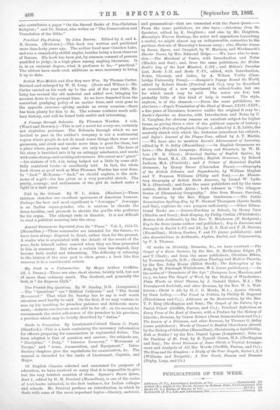Of English Classics selected and annotated for purposes of education,
we have received so many that it is impossible to give but the very briefest mention of them. Spenser's Paerie Queen, Book I., edited by H. M. Percival (Macmillan), is one of the series of text-books intended, in the first instance, for Indian colleges and schools. Mr. Percival prefixes an introduction, in which he deals with some of the more important topicsâliterary, metrical,
and grammaticalâthat are connected with the Paerie Queen.â From the same publishers, we also have :âSelections from the Spectator, edited by K. Deighton ; and also by Mr. Deighton, lifacautay's Warren Hastings, the notes and appendices furnishing a useful, we might almost say an indispensable, corrective to the partisan rhetoric of Macaulay's famous essay ; also, Shorter Poems by Burns, Byron, and Campbell, by W. Munson, and Wordsworth's Shorter Poems, by Mrs. Edmund Helps.âWe have also to men- tion :âThe Merchant of Venice, with Introduction and Notes (Blackie and Son) ; and, from the same publishers, Sir Walter Scott's Lay of the Last Minstrel, I.-III. ; and Milton's Paradise Lost, Books I.-IL and Books V.-VI., edited, with Introduction, Notes, Glossary, and Index, by A. Wilson Verity (Cam- bridge University Press).âDampier's Voyage Round the World, edited by Robert Steele (Percival and CO, may be described as something of a new experiment in school-books, but one for which much may be said. The notes are few, but probably little of this kind of help is wanted. The style, anyhow, is of the clearest. âFrom the same publishers, we also have :âPope's Translation of the Iliad of Homer, XXIII.-XXI7., a fine piece of literature, however unlike the original it may be ; Burke's Speeches on America, with Introduction and Notes by C. E. Vaughan, for obvious reasons an excellent subject for higher forms, as giving them a view of the political aspects of history ; Macaulay's History of England, Chapter L, edited by A. E. Little, the masterly sketch with which the historian introduces his subject; and Defoe's Journal of the Plague-Year, edited by A. T. Martin.
We have also to mention Bacon's Advancement of Learning, edited by F. G. Selby (Macmillan).âIn English Grammars we have :âThe English Language: History and Structure, by W. H. Low (W. B. Clive) ; Historical Outline of English Syntax, by Francis Bond, MA. (E. Arnold) ; English Grammar, by Robert Jackson, M.A. (Percival) ; and A Primer of Historical English Grammar, by Henry Sweet (Clarendon Press).âGeographly of the British Colonies and Dependencies, by William Hughes and T. Francon Williams (Philip and Son).âAn Elemen- tary Geography of British North America, by Lionel W. Lyde, M.A. (Percival) ; and from the same publishers and by the same author, British South Africa ; both volumes in "The Glasgow Series of Elementary Geography." Also from Messrs. Percival, Our Country, by the Rev. Edgar Sanderson.âThe Public Examination Spelling-Key, by W. Stewart Thompson (Lewis Smith and Son), explains its own purpose sufficiently.âOther Educa- tional Books are :âScience-Teaching in Schools, by Henry Dyer (Blackie and Sons) ; Book-Keeping, by Philip Crellin (Whittaker) ; Modern Side Arithmetic, by the Rev. T. Mitcheson (F. Hodgson) ; Key to the Same (same author and publisher) ; Key to Exercises and
Examples in Euclid and XL, by H. S. Hall and F. H. Stevens (Macmillan); History Readers, V. and VI. (same publishers) ; and also Examinations in Arithmetic, Algebra, Euclid, and Trigonometry, by P. A. Thomas.


































 Previous page
Previous page